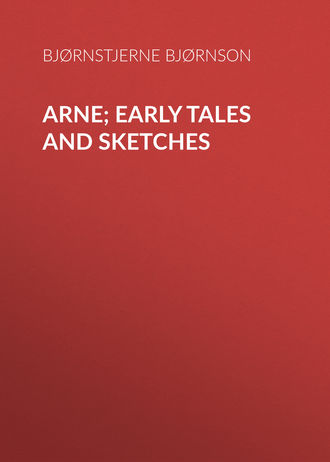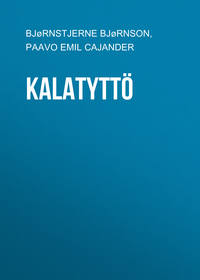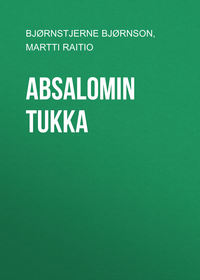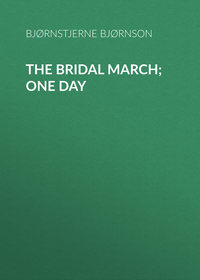 полная версия
полная версияArne; Early Tales and Sketches
Arne had no fixed errand at the parsonage, but still he wanted to learn about the papers he and the priest took together. Recently he had seen the names of several Norsemen who had done remarkably well digging gold in America, and among them was Kristian. Now Arne had heard a rumor that Kristian was expected home. He could, no doubt, get information about this at the parsonage, – and if Kristian had really returned, then Arne would go to him in the interval between spring and haying time. This was working in his mind until he had advanced so far that he could see Black Water, and Böen on the other side. The fog had lifted there, too; the sun was playing on the green, the mountain loomed up with shining peak, but the fog was still lying in its lap; the wood darkened the water on the right side, but in front of the house the ground was more flat, and its white sand glittered in the sunshine. Suddenly his thoughts sped to the red-painted building with white doors and window-frames, that he had had in mind when he painted his own. He did not remember those first gloomy days he had passed there; he only thought of that bright summer they had both seen, he and Eli, up beside her sick-bed. Since then he had not been to Böen, nor would he go there, not for the whole world. If only his thoughts barely touched on it, he grew crimson and abashed; and yet this happened again every day, and many times a day. If there was anything which could drive him out of the parish, it was just this!
Onward he went, as though he would flee from his thoughts, but the farther he walked the nearer opposite Böen he came, and the more he gazed upon it. The fog was entirely gone, the sky clear from one mountain outline to the other, the birds sailed along and called aloud to one another in the glad sunny air, the fields responded with millions of flowers; the Kamp force did not here compel gladness to bow the knee in submission and awe, but buoyant and frolicsome it tumbled over, singing, twinkling, rejoicing without end!
Arne had walked till he was in a glowing heat; he flung himself down in the grass at the foot of a hill, looked over towards Böen, then turned away to avoid seeing it. Presently he heard singing above him, pure and clear, as song had never sounded to him before; it floated out over the meadow, mingled with the chattering of the birds, and he was scarcely sure of the tune before he recognized the words too, – for the tune was his favorite one, and the words were those that had been working in his mind from the time he was a boy, and forgotten the same day he had brought them forth! He sprang up as though he would catch them, then paused and listened; here came the first stanza, here came the second, here came the third and the fourth of his own forgotten song streaming down to him: —
"Oh, how I wonder what I should seeOver the lofty mountains!Snow here shuts out the view from me,Round about stands the green pine-tree,Longing to hasten over —Dare it become a rover?"Soars the eagle with strong wing play,Over the lofty mountains;Rows through the young and vigorous daySating his courage in quest of prey;When he will swooping downward,Tow'rd far-off lands gazing onward."Leaf-heavy apple, wilt thou not goOver the lofty mountains?Forth putting buds 'mid summer's glow,Thou wilt till next time wait, I know;All of these birds art swinging,Knowing not what they're singing."He who for twenty years longed to fleeOver the lofty mountains,Nor beyond them can hope to see,Smaller each year feels himself to be;Hears what the birds are singing,Thou art with confidence swinging."Bird, with thy chatt'ring, what wouldst thou hereOver the lofty mountains?Fairer the lands beyond must appear,Higher the trees and the skies far more clear.Wouldst thou but longing be bringing,Bird, but no wings with thy singing?"Shall I the journey never takeOver the lofty mountains?Must my poor thoughts on this rock-wall break?Must it a dread, ice-bound prison make,Shutting at last in around me,Till for my tomb it surround me?"Forth will I! forth! Oh, far, far away,Over the lofty mountains!I will be crushed and consumed if I stay;Courage tow'rs up and seeks the way,Let it its flight now be taking,Not on this rock-wall be breaking!"One day I know I shall wander afarOver the lofty mountains!Lord, my God, is thy door ajar?Good is thy home where the blessed are;Keep it though closed a while longer,Till my deep longing grow stronger."25Arne stood still until the last verse, the last word, had died away. Again he heard the birds sporting and twittering, but he knew not whether he himself dared stir. Find out who had been singing, though, he must; he raised his foot and trod so carefully that he could not hear the grass rustle. A little butterfly alighted on a flower, directly at his feet, had to start up again, flew only a little piece farther, had to start up again, and so on all over the hill as he crept cautiously up. Soon he came to a leafy bush, and cared to go no farther, for now he could see. A bird flew up from the bush, gave a startled cry and darted over the sloping hill-side, and then she who was sitting within view looked up. Arne stooped far down, holding his breath, his heart throbbing so wildly that he heard its every beat, listening, not daring to move a leaf, for it was, indeed, she, – it was Eli whom he saw!
After a long, long while, he looked up just a little, and would gladly have drawn a step nearer but he thought the bird might perhaps have its nest under the bush, and was afraid he would tread on it. He peered out between the leaves as they blew aside and closed together again. The sun shone directly on her. She wore a black dress without sleeves,26 and had a boy's straw hat perched lightly on her head, and slanting a little to one side. In her lap lay a book, and on it a profusion of wild flowers; her right hand was dreamily toying with them; in her left, which rested on her knee, her head was bowed. She was gazing in the direction of the bird's flight, and it really seemed as though she had been weeping.
Anything more lovely Arne had neither seen nor dreamed of in his whole life; the sun, too, had scattered all its gold over her and the spot where she was sitting, and the song still floated about her, although its last notes had long since been sung, so that he thought, breathed – aye, even his heart beat in time to it.
She took up the book and opened it, but soon closed it again and sat as before, beginning to hum something else. It was, "The tree's early leaf-buds were bursting their brown." He knew it at once, although she did not quite remember either the words or the tune, and made many mistakes. The stanza she knew best was the last one, therefore she often repeated it; but she sang it thus: —
"The tree bore its berries, so mellow and red:'May I gather thy berries?' a sweet maiden said.'Yes, dear; all thou canst see;Take them; all are for thee;'Said the tree – trala-lala, trala, lala – said."27Then suddenly she sprang up, scattering the flowers all around her, and sang aloud, so that the tune, as it quivered through the air, could easily be heard all the way over to Böen. And then she ran away. Should he call after her? No! There she went skipping over the hills, singing, trolling; her hat fell off, she picked it up again; and then she stood still in the midst of the tallest grass.
"Shall I call after her? She is looking round!"
He quickly stooped down. It was a long while before he dared peep forth again; at first he only raised his head; he could not see her: then he drew himself up on his knees, and still could not see her; finally, he got all the way up. No, she was gone! He no longer wanted to go to the parsonage. He wanted nothing!
Later he sat where she had been sitting, still sat there until the sun drew near the meridian. The lake was not ruffled by a single ripple; the smoke from the gards began to curl upward; the land-rails, one after another, had ceased their call; the small birds, though, continued their sportive gambols, but withdrew to the wood; the dew was gone and the grass looked sober; not a breath of wind stirred the leaves; it was about an hour from noon. Arne scarcely knew how it was that he found himself seated there, weaving together a little song; a sweet melody offered itself for it, and into a heart curiously full of all that was gentle, the tune came and went until the picture was complete. He sang the song calmly as he had made it: —
"He went in the forest the whole day long,The whole day long;For there he had heard such a wonderful song,A wonderful song."He fashioned a flute from a willow spray,A willow spray,To see if within it the sweet tune lay,The sweet tune lay."It whispered and told him its name at last,Its name at last;But then, while he listened, away it passed,Away it passed."But oft when he slumbered, again it stole,Again it stole,With touches of love upon his soul,Upon his soul."Then he tried to catch it, and keep it fast,And keep it fast;But he woke, and away in the night it passed,In the night it passed."'My Lord, let me pass in the night, I pray,In the night, I pray;For the tune has taken my heart away,My heart away.'"Then answered the Lord, 'It is thy friendIt is thy friend,Though not for an hour shall thy longing end,Thy longing end;"'And all the others are nothing to thee,Nothing to thee,To this that thou seekest and never shalt see,Never shalt see.'"28CHAPTER XV
It was a Sunday evening in midsummer; the priest had returned from church, and Margit had been sitting with him until it was nearly seven o'clock. Now she took her leave, and hastened down the steps and out into the yard, for there she had just caught sight of Eli Böen, who had been playing for some time with the priest's son and her own brother.
"Good evening!" said Margit, standing still, "and God bless you all!"
"Good evening!" replied Eli, blushing crimson, and showing a desire to stop playing, although the boys urged her to continue; but she begged to be excused, and they had to let her go for that evening.
"It seems to me I ought to know you," said Margit.
"That is quite likely," was the reply.
"This surely never can be Eli Böen?"
Yes, it was she.
"Oh, dear me! So you are Eli Böen! Yes, now I see you are like your mother."
Eli's auburn hair had become unfastened, so that it floated carelessly about her; her face was as hot and as red as a berry, her bosom heaved, she could not speak, and laughed because she was so out of breath.
"Yes, that is the way with young people."
Margit looked at Eli with satisfaction as she spoke.
"I suppose you do not know me?"
Eli had no doubt wanted to ask who she was, but could not command the courage to do so, because the other was so much older than she; now she said that she did not remember having seen her before.
"Well, to be sure, that is scarcely to be expected; old folks seldom get out. You may perhaps know my son, Arne Kampen. I am his mother." She stole a sly glance, as she spoke, at Eli, on whom these words wrought a considerable change. "I am inclined to think he worked over at Böen once, did he not?"
Yes, it was Eli's impression, too, that he had done so.
"The weather is fine this evening. We turned our hay to-day, and got it in before I left home; it is really blessed weather."
"There will surely be a good hay-harvest this year," Eli observed.
"Yes, you may well say so. I suppose everything looks splendidly over at Böen."
"They are through harvesting there."
"Oh, of course; plenty of help, stirring people. Are you going home this evening?"
No, she did not intend to do so. They talked together about one thing and another and gradually became so well acquainted that Margit felt at liberty to ask Eli to walk a short distance with her.
"Could you not keep me company a few steps?" said she. "I so seldom find any one to talk with, and I dare say it will make no difference to you."
Eli excused herself because she had not her jacket on.
"Well, I know, it is really a shame to ask such a thing the first time I meet a person; but then one has to bear with old folks."
Eli said she was quite willing to go, she only wanted to fetch her jacket.
It was a close-fitting jacket; when it was hooked, she looked as if she wore a complete dress; but now she only fastened the two lowest hooks, she was so warm. Her fine linen had a small turned down collar, and was fastened at the throat with a silver button, in the form of a bird with outspread wings. Such a one tailor Nils had worn the first time Margit Kampen had danced with him.
"What a handsome button," she remarked, looking at it.
"My mother gave it to me," said Eli.
"Yes, so I thought," and Margit helped the girl adjust it as she spoke.
Now they walked on along the road. The new-mown hay was lying about in heaps. Margit took up a handful, smelled it, and thought it was good. She asked about the live stock at the parsonage, was led thereby to inquire about that at Böen, and then told how much they had at Kampen.
"The gard has prospered finely of late years, and it can be made as much larger as we ourselves wish. It feeds twelve milch cows now, and could feed more; but Arne reads a great many books, and manages according to them, and so he must have his cows fed in a first-rate way."
Eli made no reply to all this, as was quite natural; but Margit asked her how old she was. She was nineteen.
"Have you taken any part in the house-work? You look so dainty, I suppose it has not been much."
Oh, yes, she had helped in various ways, especially of late.
"Well, it is a good thing to become accustomed to a little of everything; if one should get a large house of one's own, there might be many things to be done. But, to be sure, when one finds good help already in the house, it does not matter so very much."
Eli now thought she ought to turn back, for they had gone far beyond the parsonage lands.
"It will be some time yet before the sun sets; it would be kind if you would chat with me a little longer." And Eli went on.
Then Margit began to talk about Arne. "I do not know if you are very well acquainted with him. He can teach you something about everything. Bless me! how much that boy has read!"
Eli confessed that she was aware he had read a great deal.
"Oh, yes; that is really the least that can be said of him. Why, his conduct to his mother all his days is something far beyond that. If the old saying is true, that one who is good to his mother is sure to be good to his wife, the girl Arne chooses will not have very much to grumble about. What is it you are looking for, child?"
"I only lost a little twig I had in my hand."
They were both silent after this, and walked on without looking at each other.
"He has such strange ways," began the mother, presently; "he was so often frightened when he was a child that he got into the habit of thinking everything over to himself, and such folks never know how to put themselves forward."
Now Eli insisted on turning back, but Margit assured her that it was only a short distance now to Kampen, and see Kampen she must, as she was so near. But Eli thought it was too late that day.
"There is always some one who can go home with you," said Margit.
"No, no," promptly replied Eli, and was about to leave.
"To be sure, Arne is not at home," said Margit; "so it will not be he; but there will be sure to be some one else."
Now Eli had less objection to going; besides, she wanted very much to see Kampen. "If only it does not grow too late," said she.
"Well, if we stand here much longer talking about it, I suppose it may grow too late," and they went on.
"You have read a great deal, I dare say; you who were brought up at the priest's?"
Yes, Eli had read a good deal.
"That will be useful," Margit suggested, "when you are married to one who knows less than you."
Eli thought she would never be married to such a person.
"Ah, well, it would perhaps not be best either; but in this parish there is so little learning."
Eli asked where the smoke rising yonder in the wood came from.
"It comes from the new houseman's place belonging to Kampen. A man called Upland Knut lives there. He was alone in the world, and so Arne gave him that place to clear. He knows what it is to be lonely, my poor Arne."
Soon they reached an ascent whence the gard could be seen. The sun shone full in their faces; they held up their hands to shade their eyes and gazed down at Kampen. It lay in the midst of a plain, the houses red painted and with white window-frames; the grass in the surrounding meadows had been mown, the hay might still be seen in heaps here and there, the grain-fields lay green and rich among the pale meadows; over by the cow-house all was stir and bustle: the cows, sheep, and goats were just coming home, their bells were tinkling the dogs were barking, the milk-maids shouting, while above all rose with awful din the roar of the force in the Kamp gorge. The longer Eli looked, the more completely this grand tune filled her ears, and at last it seemed so appalling to her that her heart throbbed wildly; it roared and thundered through her head until she grew bewildered, and at the same time felt so warm and tender that involuntarily she took such short, hesitating steps, that Margit begged her to walk a little faster.
She started. "I never heard anything like that waterfall," said she; "I am almost afraid of it."
"You will soon get used to it," said the mother; "at last you would even miss it if you could not hear it."
"Dear me! do you think so?" cried Eli.
"Well, you will see," said Margit, smiling.
"Come now, let us first look at the cattle," she continued, turning off from the main road. "These trees on each side Nils planted. He wanted to have everything nice, Nils did, that is what Arne likes too; look! there you can see the garden my boy has laid out."
"Oh, how pretty!" cried Eli, running over to the garden fence. She had often seen Kampen, but only from a distance, where the garden was not visible.
"We will look at that after a while," said Margit.
Eli hastily glanced through the windows, as she went past the house; there was no one inside.
They stationed themselves on the barn-bridge and watched the cows as they passed lowing into the stable. Margit named them to Eli, told how much milk each one gave, and which of them calved in the summer, which did not. The sheep were counted and let into the fold; they were of a large, foreign breed; Arne had raised them from two lambs he got from the south. "He gives much attention to all such things, although you would not think it of him."
They now went into the barn, and examined the hay that had been housed, and Eli had to smell it – "for such hay is not to be found everywhere." Margit pointed through the barn-hatch over the fields, and told what each one yielded and how much was sown of each kind of seed.
They went out toward the house; but Eli, who had not spoken a word in reply to all that had been said, as they passed by the garden, asked if she might go into it. And when leave had been given her to go, she begged to be allowed to pluck a flower or two. There was a little bench away in one corner; she went and sat down on it, only to try it, apparently, for she rose at once.
"We must hurry now, if we would not be too late," said Margit, standing in the door. And now they went in. Margit asked Eli if she should offer her some refreshments on this her first visit; but Eli blushed and hastily declined. Then the girl's eyes wandered all around the room they had entered; it was where the family sat in the day-time, and the windows opened on the road; the room was not large but it was cozy, and there was a clock and a stove in it. On the wall hung Nils's fiddle, dingy and old, but with new strings. Near it also hung a couple of guns belonging to Arne, an English angling-rod and other rare things which the mother took down and showed to Eli, who looked at them and handled them. The room was without paint, for Arne disliked it; nor was there any painting in the room looking toward the Kamp gorge, with the fresh green mountains directly opposite and the blue ones in the background; this latter room, – which was in the new part of the building, as was the entire half of the house it was in, – was larger and prettier than the first. The two smaller rooms in the wing were painted, for there the mother was to live when she was old, and Arne had brought a wife into the house. They went into the kitchen, the store-house, the bake-house, Eli spoke not a single word; indeed, she viewed everything about her as though from afar off; only when anything was held out for her inspection she touched it, but very daintily. Margit, who had kept up an unbroken stream of chatter the whole way, now led her into the passage again; they must go and take a look up-stairs.
There also were well-arranged rooms, corresponding with those below; but they were new and had scarcely yet been occupied, except one, which looked toward the gorge. In these rooms were kept all sorts of articles which were not in daily household use. Here hung a whole lot of robes, together with other bedclothes; the mother took hold of them, lifted them up, and now and then insisted on having Eli do the same. Meanwhile, it actually seemed as though the young girl were gaining a little courage, or else her pleasure in these things increased; for to some of them she went back a second time, asked questions about them, and became more and more interested.
Finally the mother said, "Now at last we will go into Arne's own room;" and then they went into the room overlooking the Kamp gorge. Once more the awful din of the force smote upon their ears, for the window was open. They were up so high that they could see the spray rising between the mountains, but not the force itself, save in one spot farther on, where a fragment had fallen from the cliff, just where the torrent, with all its might, took its final leap into the depths below. Fresh turf covered the upward turned side of this fallen piece of rock, a few fir cones had buried themselves in it, and sent forth a growth of trees with their roots in the crevices. The wind had tugged at and shaken the trees, the force had washed them so completely that there was not a branch four ells from the roots; they were crooked in the knees, their boughs knotted and gnarled, yet they kept their footing, and shot far up between the rocky walls. This was the first thing Eli noticed from the window; the next, the dazzling white snow-capped peaks rising above the green mountains. She turned her eyes away, let them wander over the peaceful, fruitful fields, and finally about the room where she stood; the roar of the force had hitherto prevented this.
How calm and cheerful it was within, compared with the scene without. She did not look at any single article, because one blended into the other, and most of them were new to her, for Arne had centred his affections in this room, and, simple as it was, it was artistic in almost every particular. It seemed as though the sound of his songs came floating toward her, while she stood there, or as though he himself smiled at her from every object. The first thing her eyes singled out in the room, was a broad, handsomely carved book-shelf. There were so many books on it that she did not believe the priest had more. A pretty cabinet was the next thing she noticed. Here he kept many rare things, his mother said. Here, too, he had his money, she added, in a whisper. They had twice had property left to them, she told afterwards; they would have one more inheritance besides, if things went as they should. "But money is not the best thing in the world, after all. Arne may get what is far better."
There were many little trinkets in the room which were interesting to examine, and Eli looked at them all, as happy as a child.
Margit patted her on the shoulder, saying, as she looked brightly into her eyes, "I have never seen you before to-day, my child, but I am already very fond of you." Before Eli had time to feel embarrassed, Margit pulled at her dress, and said, quite softly, "You see that little red chest; there is something nice in that, I can tell you."
Eli looked at the chest: it was a small, square one, which she at once longed to call her own.
"Arne does not want me to know what is in that chest," whispered the mother, "and he always keeps the key hid." She walked up to some clothes hanging on the wall, took down a velvet waistcoat, felt in the watch-pocket, and there found the key. "Come, now, you shall see," she whispered.









